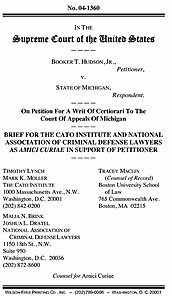Learn more about Cato’s Amicus Briefs Program.
This brief, joined by the National Association of Criminal Defense Lawyers, examines the extent to which the exclusionary rule, requiring suppression of evidence collected unconstitutionally, applies when police enter a home, recover incriminating evidence, without first announcing themselves. The Supreme Court has required police officers to knock and announce their presence before entering a home, absent a special risk of danger. This “knock-and-announce” rule is essential to protecting the sanctity of the home and the safety of innocent homeowners: In dozens of documented cases, bad information has led to an unannounced late-night raid on the wrong residence, forcing startled homeowners to decide whether armed intruders are criminals worth resisting or police officers to whom they should submit. Even so, in Hudson, the state of Michigan contends that evidence seized in violation of the knock-and-announce rule can be admitted in court so long as police possess a warrant. As Cato’s brief underscores, that permissive rule would eliminate police incentives to announce themselves before entry, and unravel the Fourth Amendment’s protections against dangerous unannounced home invasions by law enforcement.

This work is licensed under a Creative Commons Attribution-NonCommercial-ShareAlike 4.0 International License.


